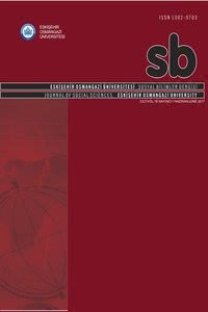Muhasebede sınıflandırma: kronolojik bir inceleme
Classification on accounting: a chronogical review
___
- American Accounting Association (AAA), (1977). Report of the American Accounting Association Committee on International Accounting Operations and Education, Accounting Review, 52 (2) Supplement: 65-132.
- Baker, R. (2007). Trends in Research on International Accounting Harmonisation, The International Journal of Accounting, 42(3): 262-277.
- Choi, F., ve Mueller, G. (1992). International Accounting, Second Edition, Prentice-Hall USA.
- d'Arcy, A. (2000). The Degree of Determination of National Accounting Systems-An Empirical Investigation, Scmalenbach Business Review, 52 :45-67.
- d'Arcy, A. (2001). Accounting Classification and The International Harmonisation Debate-An Empirical Investigation, Accounting, Organizational Society, 26 (4-5), 327-349.
- d'Arcy, A. (2004). Accounting Classification and International Harmonisation Debate: A Replay to a Comment, Accounting Organization and Society, 29,: 201-206.
- Doupnik, S. T. ve Salter, B. S. (1993). An Empirical Test of Judgmental International Classification of Financial Reporting Practices, Journal of International Business Studies, 24 (1):41 -60.
- Frank, W. G. (1979). An Empirical Analysis of International Accounting Principles, Journal of Accounting Research, 17 (2): 593-605.
- Gray, S. J. (1988). Towards of Cultural Influence on the Development of Accounting Systems Internationally, Abacus, 24(1): 1-15.
- Hatfield, H. R. (1966). Some Variations in Accounting Practice in England, France, Germany and United States, Journal of Accounting Research, 4(2): 166-182.
- Hossain, M., (2008). The Extent of Disclosure in Annual Reports of Banking Companies: The Case of India, European Journal of Scientific Research, 23 (4) :659-680.
- Nair, R. D. ve Frank, W. G. (1980). The Impact of Disclosure and Measurement Practices on International Accounting Classifications, Accounting Review, 55 (3): 426-450.
- Nobes, C, ve Parker R. (2002). Comparative International Accounting, 7th ed. London, UK: Financial Times Prentice Hall.
- Nobes, C. (1992). International Classification of Financial Reporting, Second Edition, Routladge, Taylor and Francis Group, London.
- Nobes, C. (1998). Towards a Genaral Model of the Reasons for the International Differences in Financial Reporting, Abacus, 34 (2): 162-187.
- Nobes, C. (2004). On Accounting Classification and International Harmonisation Debate, Accounting Organization and Society, Vol.29 : 189-200.
- Nobes, C. (2008). Accounting Classification in the IFRS Era, Australian Accounting Review, No.46 18 (3): 191-196.
- Nobes, C. ve Alexander, D. (2004). Financial Accounting An International Introduction, Second Edition, Financial Times Prentice Hall, UK.
- Puxty, A., Willmot, H., Cooper, D. ve Lowe, T. (1987). Modes of Regulating in Advanced Capitalism: Locating Accountancy in Four Countries, Accounting Organizations and Society, 12 (3) 273-291.
- Salter, S. ve Niswander, F. (1995). Cultural Influence on the Development of Accounting Systems Internationally: A Test of Gray's [1988] Theory, Journal of International Business Studies, 26, (2) (2nd Qtr., 1995): 379-397.
- Seidler, L. J. (1967). International Accounting-The Ultimate Theory Course, Accounting Review, 42 (4): 775-781.
- Shoental, R. (1989). Classification of Accounting Systems Using Competencies As a Discriminating Variable: A Great Britain - United States Study, Journal of Business Financed Accounting, 16 (4): 549-5 63.
- Yazıcı, M. (1998). Muhasebe Tümlemleri ve Örgütlenmesi, Nihat Sayar Eğitim Vakfı yayın No: 522/756, Yaylım Matbaası, İstanbul.
- Başlangıç: 2000
- Yayıncı: -
Yolcuların Ulaşım Aracı Olarak Yüksek Hızlı Treni Tercih Nedenleri Üzerine Bir Araştırma
Arzu KILIÇLAR, Yaşar Sarı Ve Cihan SEÇİLMİŞ
CUMHURİYET DÖNEMİNDE TOKAT’IN MARUZ KALDIĞI SELLER (1934-1949)
Yapılandırmacı Düşünme ve Stresle Başa Çıkma: Bir Yapısal Eşitlik Modelleme Çalışması
Engin KARADAĞ, Nuri Baloğlu Ve Sedat YÜKSEL
TEORİK BİR ÇERÇEVEDE WHİSTLEBLOWİNG-ETİK İLİŞKİSİ
Derya Ergun ÖZLER, Derya ERGUN ÖZLER, Meltem Dil Şahin Ve Ceren Giderler ATALAY, Meltem DİL ŞAHİN, Ceren GİDERLER ATALAY
ÖTEKİLER’İN TEMSİLLERİ: RESTORASYON SAHNESİNDE MÜSLÜMAN TÜRK İMAJI
Enerji kullanımının küresel ısınmaya etkisi ve önleyici politakalar
Cunhuriyet döneminde Tokat'ın maruz kaldığı seller (1934-1949)
Classical schools of sociology and terrorism
Süleyman ÖZEREN, Hüseyin CİNOĞLU
Pierre bourdieu'nun neoliberalizm eleştirisi bağlamında Eğitim yönetimini yeniden düşünmek
